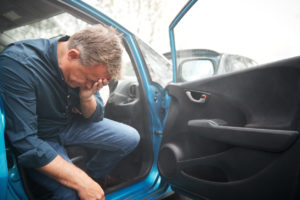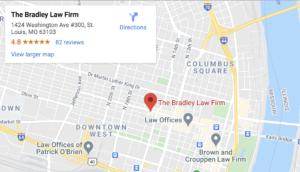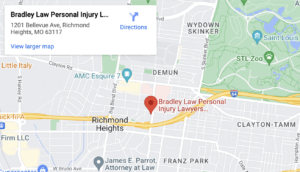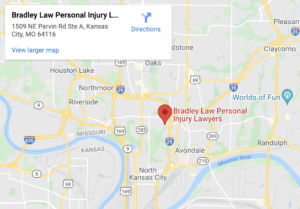
You may have read or heard that you should never say you are sorry or apologize for a car accident. The reason? Some may interpret your statement as an admission of fault. Admitting fault for the accident makes you liable for any damages caused by the crash.
Never admit fault at the scene of a car wreck. You cannot be sure whether you are at fault until all of the factors that contributed to the collision are analyzed. An accident report submitted by a police officer is merely the officer’s observations at the accident scene.
Talk with a car accident lawyer instead of relying on what the police officer decided or what an insurance claim adjuster says. An attorney will give you an honest assessment of your car accident case and advise you of your rights regarding a personal injury lawsuit.
Missouri Is an At-Fault Car Insurance State
No-fault insurance states require drivers to maintain Personal Injury Protection or other forms of no-fault insurance. When a car accident occurs, each driver files an insurance claim with their auto insurer. Regardless of who caused the accident, the no-fault insurance compensates the insured for medical bills and lost wages.
However, no-fault insurance does not compensate accident victims for all damages, which is one problem with this type of insurance. An accident victim may only receive reimbursement for a portion of their lost wages and medical bills. They cannot recover compensation for pain and suffering, even if the other driver admits fault.
Missouri is an at-fault insurance state.
Therefore, drivers must carry minimum liability insurance for car accidents in the following amounts:
- Bodily injury to one person $25,000
- Bodily injury per accident $50,000
- Property damage $25,000
Car accident claims are based on negligence. To prove negligence, you must show that the other driver’s conduct directly led to the car accident. You must also prove that the accident caused your injuries, which resulted in damages.
Therefore, giving any indication that you could be at fault for the cause of a car accident could result in denial of your car accident claim.
What Damages Can I Receive for a Car Accident Claim?
If the other driver admits fault in a car accident case, you could recover compensation from the insurance company for non-economic and economic damages such as:
- Medical bills and expenses
- The cost of occupational, physical, and other therapies
- The cost of personal care and in-home health care
- Loss of benefits and income, including decreases in earning potential and future lost wages
- Mental, emotional, and physical pain and suffering
- Impairments, disabilities, and scarring
- Decrease in quality of life and loss of enjoyment of life
If you admit fault for the car accident, you are responsible for the above damages. Even admitting partial responsibility for causing a car accident can result in thousands of dollars in damages that you are responsible for paying.
Comparative Fault and Missouri Car Accidents
Missouri has adopted a pure comparative fault standard for dividing liability for damages in personal injury cases. In other words, you are only responsible for the percent of damages that matches your percentage of fault.
When fault is disputed for a car accident, a jury determines responsibility based on the evidence presented during the trial. If the jury finds that both parties contributed to the cause of the accident, the jury determines the percentage of fault for each party.
For example, if a jury determines that you were 40 percent at fault for a red light accident, you would not be entitled to compensation for all damages. You would only receive 60 percent of the value of your damages. Therefore, if your damages are worth $100,000, the most you could obtain would be $60,000.
Comparative negligence is a tool that many insurance companies use to undervalue car accident claims. Insurance adjusters ask for written or recorded statements. Then, they use the information provided by you to allege you are partially at fault for the crash.
Insurance adjusters are skilled in interviewing individuals. You may make an innocent statement that you never intended to be interpreted as admitting fault, but that is what happens. In most cases, it is best to seek legal advice before talking with an insurance adjuster after a car accident.
How Can You Avoid Being Blamed for a Car Accident?
When you are involved in a car accident, call 911 to report the crash. Avoid discussing the accident details with anyone other than the police officer. Instead, answer the officer’s questions and provide facts about how the accident occurred without adding unnecessary information.
Never admit fault. Do not say you could be responsible or you do not know if you are responsible. Request medical attention before answering questions about the accident. Your injuries may be causing confusion.
It is best to avoid social media after a car accident. However, if you do continue to use social media, do not discuss the car accident. You may believe your social media accounts are private, but they are not.
Insurance investigators have ways of gaining access to your information. Do not accept new friend requests, and do not post pictures of yourself. Insurance companies may use what you say on social media to argue that you were accepting fault for a car accident.
Contact one of our personal injury lawyers in St. Louis, MO as soon as possible to discuss your case. A lawyer can give you additional information about what you should and should not do to avoid being blamed for a car crash. If the insurance company disputes liability, a car accident lawyer can help you prove that you were not responsible for causing the car accident.
Evidence that a car accident attorney might use to prove fault for a car wreck include:
- Copies of accident reports and police reports
- Statements by a driver made at the accident scene
- Eyewitness statements
- Photographs and videos from the accident scene
- Videos of the collision taken by traffic cameras and nearby surveillance cameras
- Debris, skid marks, and other physical evidence from the accident scene
An attorney may retain experts to assist in investigating the cause of the car accident. Engineers and accident reconstructionists can use the information and evidence to analyze how the accident occurred. Identifying the factors that led to the accident helps prove liability.
Contact Our St. Louis Car Accident Lawyers for a Free Consultation
Proving liability for a car accident can be challenging. Our legal team has substantial experience investigating car accidents. In addition, we have the resources necessary to handle complex car accident cases.
Contact our personal injury law firm at (816) 408-3448 to schedule your free consultation with an experienced St. Louis car accident lawyer from Bradley Law Personal Injury Lawyers. We are here to help you get the money you deserve when another driver causes you harm and injury.




